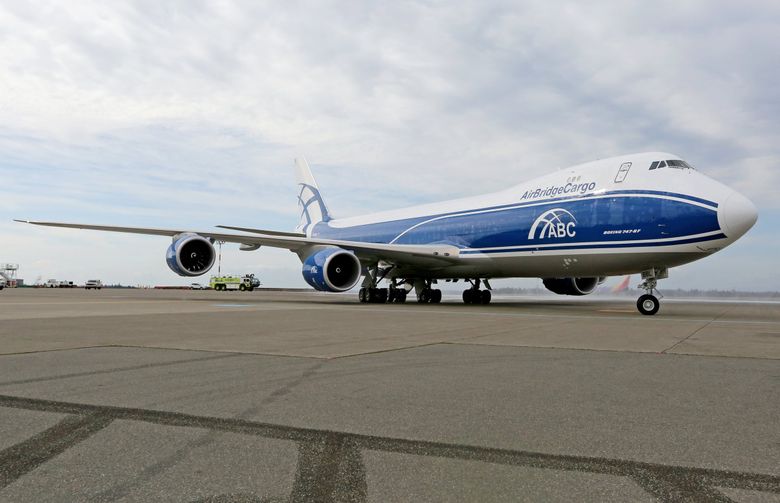
Key Russian air cargo customer sues Boeing over widebodies, highlighting how coronavirus shifted market
by Dominic GatesA lawsuit filed in Seattle this week reveals damaged relations between Boeing and an important customer for its largest cargo jets.
The legal complaint has a weird twist: Russian cargo carrier Volga-Dnepr alleges that it has a binding contract to take four widebody aircraft worth more than $600 million at standard pricing and has the money to pay for them — but that Boeing refuses to deliver the jets.
“Boeing seeks to sell them to another buyer instead, while at the same time wrongfully retaining tens of millions of dollars that plaintiff has already paid to Boeing,” Volga-Dnepr alleges in the complaint, which later pegs the money it has already paid at more than $146 million.
One could expect some tense negotiations between Boeing and its customers as airlines around the world seek to defer or cancel jet orders during the devastating aviation downturn caused by the coronavirus pandemic.
Yet in the current dire circumstances, Boeing has said it will try everything possible to accommodate customers and avoid outright cancellations.
The strange standoff between Boeing and Volga-Dnepr developed earlier this year when the Russian carrier first told Boeing it couldn’t take a 747-8 and three 777 freighter jets due for near-term delivery — and then some months later, changed its mind.
Advertising
A leading operator of the world’s biggest cargo jets, Volga-Dnepr is one of only two customers left for Boeing’s fading 747 jumbo jet.
On a visit to Seattle in 2016, company president Alexey Isaikin requested to have dinner with the late Boeing engineer Joe Sutter — whom he admired for leading the original development of the aircraft in the 1960s — and declared the latest 747-8 model “the best cargo plane in the world.”
Boeing’s website indicates that Volga-Dnepr has commitments for four of the jets pending. However, in March, those were removed from the official backlog, leaving only an order from UPS for 13 remaining.
Volga Dnepr also has pending orders for nine Boeing 777 freighters, which are important to keep the 777 assembly line in Everett going until production of the new 777X ramps up.
Volga-Dnepr claims that in January, due to “general economic conditions in the air freight market, and disruptions to trade with China at the beginning of the COVID-19 pandemic” it was forced to temporarily ground half its aircraft fleet and could not obtain financing to complete the Boeing purchases.
On Jan. 17, it informed Boeing it couldn’t accept the 747-8 and needed “to rescind the purchase agreement.” On Jan. 22, it sent another letter to Boeing announcing it “could not fulfill its contractual obligations” regarding the three 777 freighter jets.
Advertising
However, by early April, “the COVID-19 pandemic caused a dramatic increase in demand for large freight aircraft,” the complaint states. That’s when China opened up somewhat, global supply chains began refilling depleted inventory stocks and demand for medical equipment surged.
Volga-Dnepr then managed to secure financing for the four aircraft, and on April 13, revoked its previous statement and declared itself ready to take delivery of the 747-8 “as soon as possible.”
On May 1, it retracted its statement that it couldn’t honor the 777 contract, and said it was able to take delivery of those, too.
But apparently Volga-Dnepr’s earlier letters had conveyed to Boeing that the orders were definitively dead and wouldn’t be revived.
So according to the lawsuit, before Volga-Dnepr reversed itself, Boeing had told the Russians it would move to re-sell the four planes. In a letter also dated April 13, Boeing told Volga-Dnepr it was “in ‘advanced discussions’ to sell the 777s to another buyer.”
Volga-Dnepr’s complaint cites the mere 46-day gap between Feb. 28, when it was due to take delivery of the 747-8, and April 13, when it declared it was ready to take the jet.
It argues that it should be penalized no more than having to pay 46 days of storage fees. Otherwise, it wants all four airplanes and is suing for damages as well.
“Boeing is seeking to unjustly enrich itself in the midst of a global pandemic,” Volga-Dnepr’s complaint declares.
In an email from Moscow, company spokeswoman Marina Isaykina offered a softer tone.
She said Volga-Dnepr “firmly believes in Boeing’s leadership in the development and production of the best cargo aircraft and count on Boeing to be interested in retaining us as a customer and a long-term strategic partner.”
Boeing declined to comment on the pending litigation but said “Volga-Dnepr is a valued customer with 27 Boeing airplanes in their fleet.”
“We work very closely with all of our customers to fully understand their requirements and develop flexible solutions to support them,” Boeing said.
Dominic Gates: 206-464-2963 or dgates@seattletimes.com; on Twitter: @dominicgates.